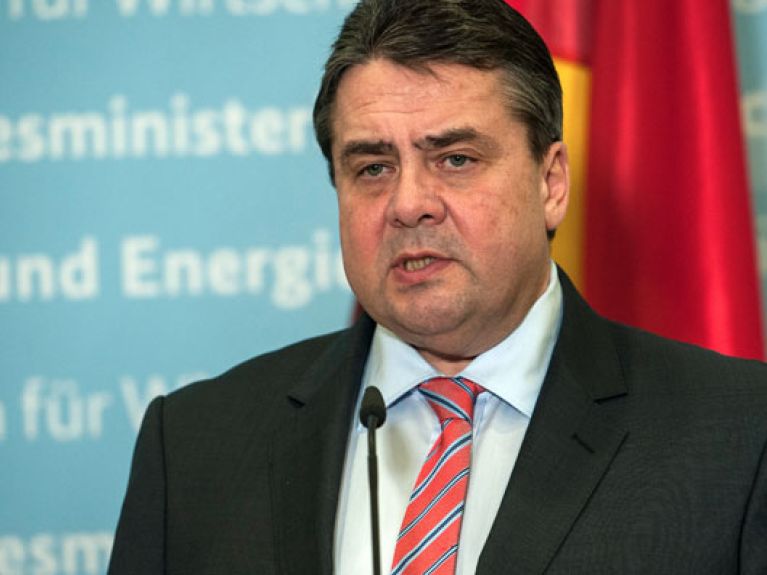Completing the energy transition
Deputy Chancellor Sigmar Gabriel wants to exploit the opportunities of the energy transition to build an economic success story.

Why is an industrialized nation like Germany seeking to reorganize its energy supply and achieve the transition to renewable energies?
The energy transition will be one of Germany’s most important economic policy projects for the foreseeable future. There are several reasons for the energy transition: as an industrial nation we wish to phase out nuclear energy and increase the proportion of renewable energies. Second, we want to reduce our dependence on international oil and gas imports. Third, it will also enable us to achieve our climate protection targets and, fourth, the energy transition is leading to the development of new technologies and, associated with that, new growth industries with new jobs. And finally Germany would like to be a model for other countries and demonstrate that a sustainable energy policy can be economically successful. That is because climate and resource protection is all the more effective, the more countries that are involved.
The energy transition is sometimes interpreted abroad as the “romantic adventure” of a wealthy country. Is Germany putting its energy supply security at risk by pursuing the energy transition?
No. Security of energy supply is very important to an industrialized country like Germany, where it has already reached a very high standard compared to the rest of the world. We will also ensure that that remains the case in the future. Here we are confronted by new challenges: conventional electricity generation, grids and renewable energy plants must be better coordinated and supply and demand better matched. Several important improvements of the existing system will be required to overcome these challenges.
The energy transition is one of the central projects of the new legislative period and it has a prominent place in the coalition agreement. Your ministry was reorganized and is now intended to provide central support for the energy transition. What do you expect of this restructuring? And what goals have you set yourself when it comes to the realization of the energy transition?
The concentration of energy expertise in one ministry, the new Federal Ministry for Economic Affairs and Energy, is an important prerequisite for the further successful realization of the energy transition. The departments dealing with renewable energies, energy efficiency, energy infrastructure (grids, power plants) and energy legislation are now together under one roof. That will enable us to energetically initiate a fundamental reform of the Renewable Energy Sources Act (EEG), for example, with an “energy policy from a single source”. The goals of energy supply security, economic efficiency and environmental compatibility and climate protection are receiving equal priority in the implementation of the energy transition. They form the “energy policy triangle” upon which our work is based.
Since it was introduced in Germany in the 1990s, the Renewable Energy Sources Act (EEG) has been used as a model and copied by many countries. Nevertheless, it is getting a little long in the tooth. You now intend to replace it with EEG 2.0. What will the main changes be?
The EEG has been a success. It has enabled renewable energies to move beyond a niche existence and become one of the main pillars of the German electricity supply system with a share of 25%. They will soon be the dominant energy source for our electricity supply. If they are to continue to grow in the future, however, the EEG must be revised and structured in a more market-oriented way. That is why the Federal Cabinet agreed the main points of a fundamental reform of the EEG on 22 January. In particular, this change will focus on significantly slowing down further cost increases, on sharing costs more equitably, on systematically controlling the expansion of renewable energies and advancing the market integration of renewable energies. That is also an important factor if we do not wish to endanger the high level of acceptance of the energy transition in German society at present.
Until now, many energy-intensive companies have been partially exempted from the green electricity levy. Changes are currently being discussed on this point. Will companies become less competitive as a result?
It is clear that the possibility of a partial exemption from the EEG levy must and will continue to exist for energy-intensive companies, especially in view of the rather high energy costs of German businesses by international standards. This so-called Special Equalization Scheme within the EEG is very important for preserving the competitiveness of our industry and therefore also our jobs. However, we want to restrict this cost cap to those businesses that are really dependent on it as a result of their competitive situation. After all, the larger the number of partially exempted firms, the larger the amount the remaining consumers have to pay.
In Germany there is an all-party consensus in favour of the energy transition – and consumers support it too. Nevertheless, there is some dispute about the correct path towards its realization. Critics accuse you of endangering jobs in renewable energies with the reform of its funding. How would you answer them?
The energy transition opens up substantial opportunities for Germany. We have succeeded in developing new and internationally competitive technologies, especially in the fields of renewable energies and energy efficiency. Numerous new areas of business and jobs have been created as a result. Renewable energies are well on the way to becoming the definitive technology for electricity generation in Germany.
As minister for economic affairs, you would also like to make the energy transition an economic success. How can that be achieved? And can the energy transition also yield benefits in international competition?
We must bring the energy transition to fruition and simultaneously strengthen security of supply and the competitiveness of businesses in Germany. Because it is very clear that the energy transition cannot be achieved free of charge, cost-effectiveness must be a central criterion in its implementation. If we successfully address this challenge, there is a good chance that our energy transition will be emulated worldwide.
Sometimes, on windy and sunny days, so much electricity is produced that it has to be given away. The energy companies are complaining about unprofitable power plants. Can you envisage a new electricity market that benefits everyone – the environment, the energy companies and consumers? What would it look like?
First of all, there have not yet been any significant electricity surpluses, and very low electricity prices occur for only a few hours a year. Nevertheless, as the share of renewable energies steadily grows we must better synchronize it with conventional generation and distribution – and also demand. After all, flexible fossil fuel-fired power plants that use coal and gas will continue to be required while the fluctuating output from renewable sources cannot be offset by other options. The profitability of conventional power plants has indeed declined – as a result, among other things, of the rapid expansion of renewable energies, the current overcapacities on the German and European electricity markets and the fall in emissions trading prices. Discussion is needed here. Developing a common solution with our European neighbours would be desirable.
The EU would like to move towards a low-carbon energy supply, but it doesn’t want to instruct the 28 member states how this should be achieved. Is a domestic German energy transition meaningful on its own while other countries are still relying on nuclear power?
Today the EU is already defining important framework conditions for energy policy. Even the energy policy targets themselves are decisively influenced by the European level. This is demonstrated by the current debate on the climate and energy framework for 2030 and the associated targets in the domain of greenhouse gas reduction, the expansion of renewable energies and the increase in energy efficiency. It is therefore important that Europe pursues an ambitious climate and energy strategy. Nevertheless, the decision about each country’s national energy mix remains fundamentally within the jurisdiction of the member states. When it comes to the implementation of the European decarbonization strategy, we in Germany have adopted a clear course by pursuing the energy transition.
The energy transition is not always greeted with enthusiasm by other European countries. How can neighbouring countries be better involved?
It is true that the subject of the energy transition is often raised during discussions abroad. Naturally, I am also asked about the associated challenges. It becomes very clear, however, that there is great interest in finding joint solutions. It is very important to me that we think about the energy transition in European terms and that we bear in mind the crossborder and international perspective. As a result of its central location in Europe, the European internal energy market and crossborder transmission cables, Germany has a large number of energy industry and energy policy ties with neighbouring countries. We do not want to and cannot shape the energy transition entirely alone. We therefore constantly coordinate our energy policy measures with our neighbours, discuss them within the EU and have a series of joint energy policy projects with our neighbouring countries. I would like to further strengthen this cooperation.
The Federal Government has set up an energy research programme. What are its main emphases?
Because we regard energy research as an important strategic element of energy policy, we are strongly focusing this research on the energy transition, which is based on the pillars of energy efficiency and renewable energies. The Federal Government’s energy research programme is being pursued to a high standard and encompasses multidisciplinary and system-oriented research approaches in areas of special relevance to the energy transition. We are funding energy research in order to accelerate the development of innovative technologies that will rapidly release further potentials for reducing costs and increasing security of supply for the energy transition. ▪
Interview: Martin Orth, Janet Schayan

